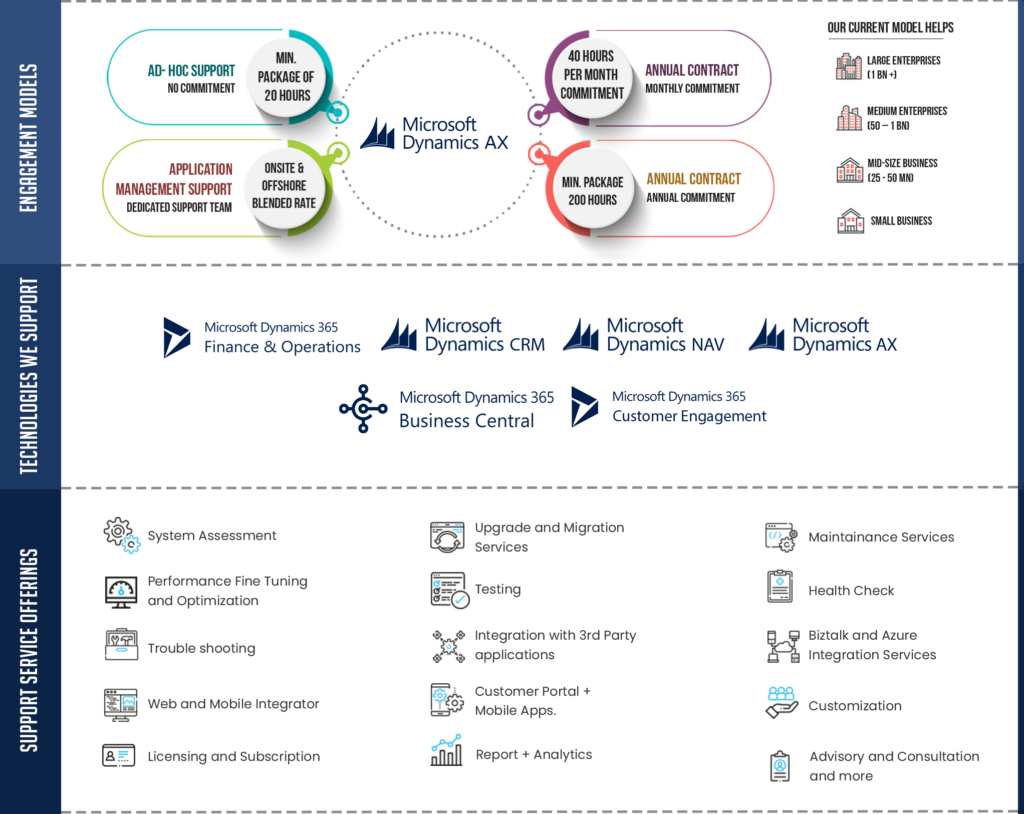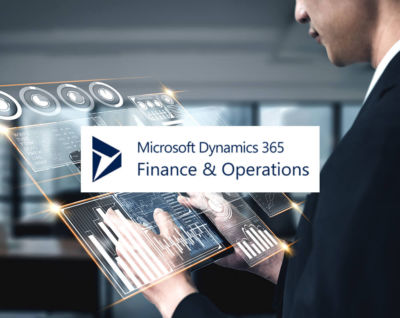
Microsoft Business Central vs Dynamics 365: What Enterprises Need to Know Before Choosing
Compare Microsoft Business Central and Dynamics 365 to understand key differences, capabilities, and which solution best fits your enterprise needs.

#DrivingExpertLedTransformation
While enterprise software is critical to supporting your evolving business needs, is it always in your best interest to immediately upgrade to the newest release? Not necessarily. Your ideal Microsoft Dynamics AX upgrade to D365 upgrade options depend on how your current software version meets your current needs. Evaluate these four major considerations:
Whichever direction your initial assessment leads, consider speaking with a knowledgeable Microsoft Dynamics 365 partner who can help you rank key metrics for a more accurate financial and functional comparison.
Regardless of which software version you use, keep in mind Microsoft’s Lifecycle Support schedule and the time required to migrate – up to two years, depending on organization size or complexity. The following expiration dates for mainstream or extended support of your existing system might impact your Dynamics AX upgrade decision.
Dynamics AX 2009. Mainstream support ended in April 2018, with extended support having ended in April 2021.
Dynamics AX 2012. Mainstream support through version R2 ended in October 2018, with extended support having ended in October 2021. If you have Version R3, mainstream support ended in October 2021, with extended support ending in January 2023.
Now that you know extended support is ending in January 2023, it’s high time for an upgrade from AX to D365. Get in touch with our ERP expert for a free consultation.

To know more about our AX Support services, read our blog.
Mobile Technology- Are instantaneous mobile applications crucial in your competitive environment? If so, explore the value Dynamics 365 mobility adds to your upgrade equation.
IoT Networks- Harness the power of new data available through expanding IoT networks.
Improved decision-making- Let Dynamics 365 Power BI (Business Intelligence) and AI (Artificial Intelligence) capabilities help you create valuable insights from rated ERP/CRM data.
.NET Framework- If you intend to exploit the versatility and forward compatibility of the .NET software framework, consider a Dynamics AX upgrade to Dynamics 365, or AX 2012 R3 at a minimum.
Extended CRM support- Even if your current CRM tool (e.g. Salesforce) meets existing needs, a Korcomptenz Microsoft Dynamics 365 consultant can show how to derive greater value by incorporating its valuable customer data into Microsoft Dynamics 365 modules.
There is a big difference between surviving with older patchwork infrastructure vs. thriving with upgraded capabilities that can transform your business in the face of rapid change, so consider.
In-house infrastructure- Your best Dynamics AX upgrade decision depends on the age of your current infrastructure. With sound infrastructure and mainstream product support provided through 2021, Dynamics AX 2012 R3 makes it practical to reap the ROI from your current investment for a longer time.
Software as a Service (SaaS)- If your current infrastructure is nearing the end of its useful lifecycle, consider the value of a Dynamics AX upgrade to the cloud-based Dynamics 365 service. You’ll gain the ability to share financial, operational, and marketing data within a single-system D365 solution. You’ll also benefit from pay-as-you-go service that can scale up and down quickly for long-term growth or temporary seasonal spikes.
Migration costs- Depending on your current solution (e.g., Dynamics AX 2009 vs. Dynamics AX 2112, R3) the cost of migrating to an upgraded D365 version can vary. A thorough infrastructure analysis can tell you whether to upgrade or stand pat for now.
Benefit from inside experience for any Microsoft Dynamics AX upgrade decision – now or in the future – with the help of an experienced Microsoft Dynamics 365 partner like Korcomptenz. Our FREE, no-obligation metrics analysis will help you compare costs and benefits among your top options. To know more about your options download our whitepaper!

Compare Microsoft Business Central and Dynamics 365 to understand key differences, capabilities, and which solution best fits your enterprise needs.

Microsoft Dynamics 365 is the next generation of intelligent business applications in the cloud. Microsoft Dynamics 365 unifies CRM and ERP capabilities by delivering new purpose-built applications to help manage specific business functions, including Dynamics 365 for Sales, Dynamics 365 for Marketing, Dynamics 365 for Customer Service, Dynamics 365 for Field Service, Dynamics 365 for Project Service Automation, Dynamics 365 for Finance and Operations, Dynamics 365 for Commerce, and Dynamics 365 for Human Resources.

For close to two decades, Korcomptenz has been helping customers, as a Trusted Consultant and Partner, to leverage Information technology, to weather and thrive amidst the winds of change in the business world.
| Cookie | Duration | Description |
|---|---|---|
| cookielawinfo-checkbox-analytics | 11 months | This cookie is set by GDPR Cookie Consent plugin. The cookie is used to store the user consent for the cookies in the category "Analytics". |
| cookielawinfo-checkbox-functional | 11 months | The cookie is set by GDPR cookie consent to record the user consent for the cookies in the category "Functional". |
| cookielawinfo-checkbox-necessary | 11 months | This cookie is set by GDPR Cookie Consent plugin. The cookies is used to store the user consent for the cookies in the category "Necessary". |
| cookielawinfo-checkbox-others | 11 months | This cookie is set by GDPR Cookie Consent plugin. The cookie is used to store the user consent for the cookies in the category "Other. |
| cookielawinfo-checkbox-performance | 11 months | This cookie is set by GDPR Cookie Consent plugin. The cookie is used to store the user consent for the cookies in the category "Performance". |
| viewed_cookie_policy | 11 months | The cookie is set by the GDPR Cookie Consent plugin and is used to store whether or not user has consented to the use of cookies. It does not store any personal data. |